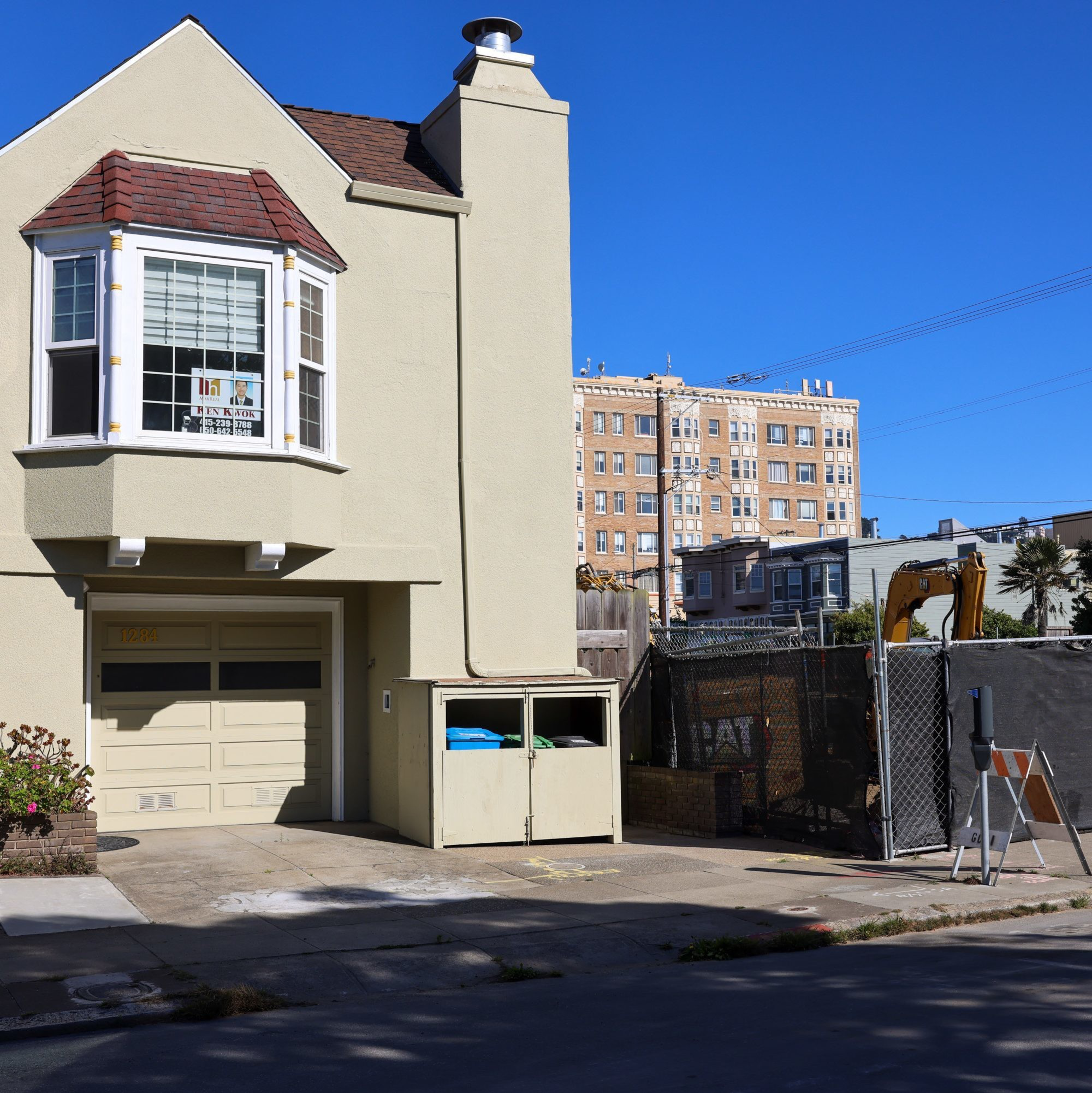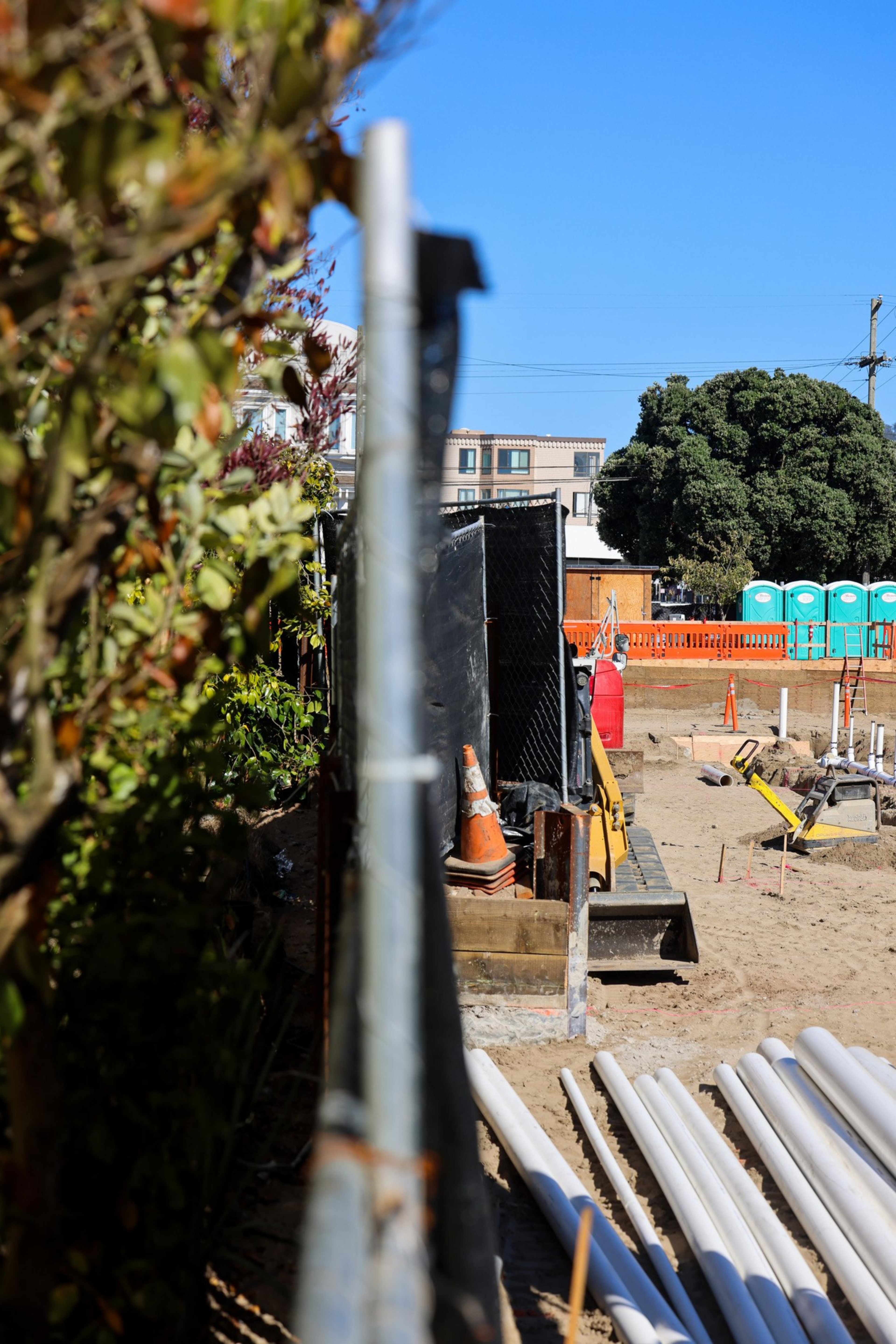Richard Chui once thought his six-bedroom, five-bathroom house in the Sunset could easily sell for $2 million. Now, five months after first listing his newly renovated property, he has lowered the price to $1.7 million in hopes of a compromise.
Yet, he’s still struggling to find a buyer — and when you stand in his living room and look south, it’s not hard to see why. Just over the property line, it’s a torn-up mess of sand and dirt, strewn with earthmovers and other heavy construction equipment. A fence and tall trees used to screen the site from view, but they were torn out as part of an affordable housing project that began construction next door in June.
Chui accuses the nonprofit developer, Tenderloin Neighborhood Development Corp. (TNDC), of destroying the fence and trees without his permission, hurting his property value and causing him mental distress.


“I believe I am being severely bullied,” Chui said. “I refuse to remain silent while my rights are brazenly violated.”
It’s only the latest drama surrounding the controversial development at 2550 Irving St., considered the first 100% affordable housing project in the sleepy Sunset District. Since the project was announced in 2021, nearby residents have protested and even pursued legal action to block it (opens in new tab), but city leaders and pro-housing advocates pushed it through, arguing the neighborhood needed to do its part to accommodate more housing.
In June, Mayor London Breed, Supervisor Joel Engardio, and TNDC leaders gathered for a groundbreaking ceremony to celebrate the construction of the seven-story, 90-unit project.
“Building housing makes our communities stronger, sets our city up to thrive, and helps make San Francisco more affordable for all,” Breed said in a June statement (opens in new tab). For Chui, that marked the beginning of his nightmare.
Chui purchased his house on 27th Avenue in 2005 and is now renting a place in the Richmond while trying to sell his Sunset home. According to Chui, the nonprofit developer removed a 20-year-old shared fence in June, which he claims he has “equitable easement rights” to maintain. In July, he says TNDC took down his tall trees so now anyone outside can see through his upstairs living room and kitchen from the window, along with much of the landscaping that separated the properties.
Google Street View records and photos provided by Chui show multiple tall trees outside the house that are now gone.
The key conflicts, Chui said, are not over the property line itself, but rather that TNDC moved forward with its actions without reaching a settlement with him. Chui provided multiple emails showing that the developer proposed solutions, such as paying him $18,000 and repairing material damage to his property caused by the project’s construction.
But Chui said he never agreed to any of the proposals; instead, he wanted an 8-foot-tall wood fence replacement, which TNDC declined. He insisted that the nonprofit should have obtained his permission or a court order before removing the fences and trees.
The site of the 2550 Irving project, formerly home to the Police Credit Union building, has been leveled in preparation for building. While no visible structures have been erected yet, the area is a hive of construction activity with a completion date set for winter 2025.

In a statement, TNDC said that the fence in question was built on the 2550 Irving property itself, not on the property line, and that it had informed Chui of this in late 2023. Regarding the tree removal, the nonprofit explained that the root structure was encroaching on the 2550 Irving St. property and would be impacted by the fence removal.
“After making several attempts to reach an agreement and giving [Chui] several notices, we removed the encroachment after commencing construction,” TNDC’s statement said. “We have continued to offer him compensation for the loss of his trees.”
However, Chui claims that TNDC has conducted “excessive destruction,” overreaching onto his property.
Hung Kwok, the real estate agent for Chui’s property, said in an interview that many potential buyers who have come to see the house are disappointed by the messy fence and construction situation, which has made the property “unpresentable” for now. Kwok also noted that a nearby home with much smaller space, but not directly affected by the construction, recently sold for nearly $2 million, while Chui has had to reduce his asking price by $300,000.
Both Engardio’s and Breed’s offices have weighed in to mediate between Chui and the nonprofit.

“It certainly has been difficult for the homeowner to deal with a massive construction site inches from the side of his house,” Engardio said. “This is ultimately a private dispute that my office cannot directly resolve. I hope both parties can reach a solution that works for everyone.”
The Mayor’s Office of Housing and Community Development also said that it’s aware of the conflicts and is having ongoing conversations about a solution to ensure the affordable housing project can move forward on schedule while making sure concerns are addressed.
Chui said he had hoped to sell the house as soon as possible but given the two-year construction timeline, he’s now considering waiting until the project is complete. He rejects being labeled an anti-housing “NIMBY,” noting that he’s a Marine who supports the Irving project, knowing it will help formerly homeless veterans.
“Building affordable housing should not be at the expense of nearby owners’ quality of life,” he said.
